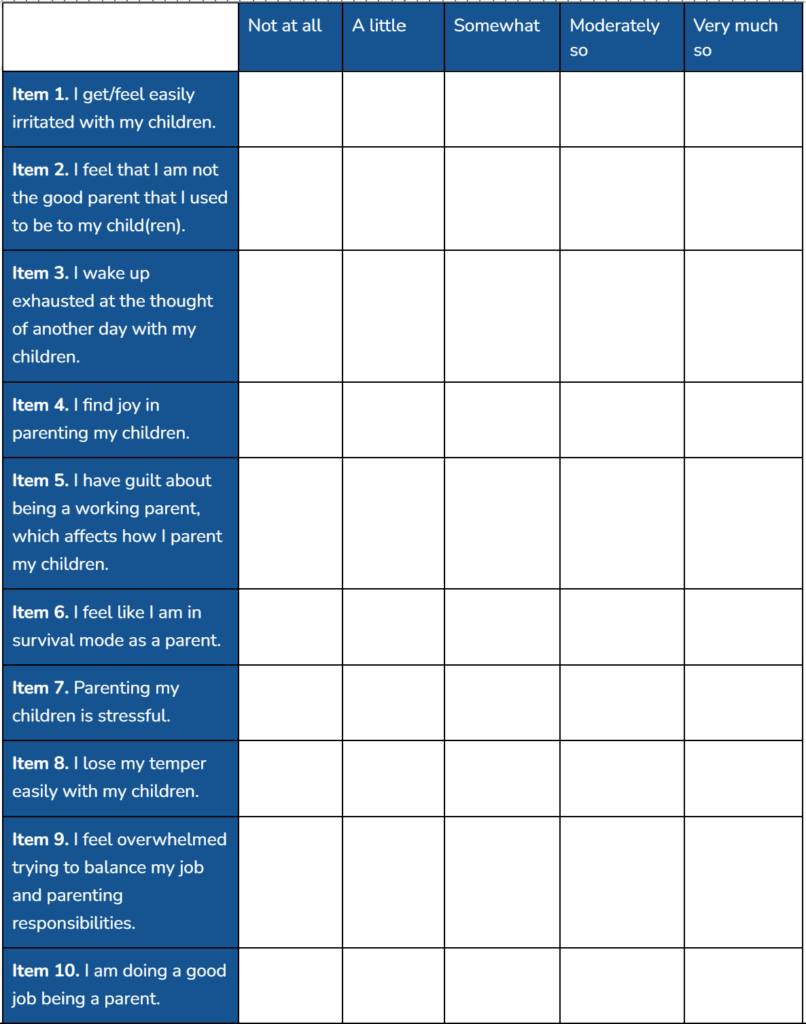Caring for another human being takes an immense amount of emotional, physical and mental labour, at times requiring more resources than an individual can provide. When a child needs intensive support, caregivers tend to stop prioritising self-care and push their needs to last on the list. The lack of free time and opportunities to regulate can culminate into a mental health issue serious enough to require help from a mental health professional.
What can I do to recover from parental burnout
The recovery path of parental burnout will depend on the severity of your symptoms and the resources available to you. One thing is for certain, recovery is very personal and requires a combination of strategies rather than one solution.
Reduce demands on yourself and your family – unless it is of critical importance, drop the demand. Forget about regular cleaning, cooking elaborate meals, hosting people, etc. Change gears to survival mode until you have the energy for more than getting through the day.
Practice self-compassion – parenting is challenging for everyone and it’s absolutely okay to make mistakes and have grilled cheese sandwiches for dinner. The idea of perfection is your enemy in parental burnout. Thinking “if I get a good night’s sleep I’ll be ok” or “I just need a few hours to myself” will get you back on track is sure to set you up for failure because burnout requires more than a good night’s sleep or a few hours of solitude.
Ask for help – reach out to friends, family, or parenting groups for emotional support, practical assistance, and reassurance. If you have the financial means, use it to hire a cleaner, buy premade dinners and get a babysitter. There are some free respite and mental health services that might be available to you. Run an internet search for your local area and call them. There are no awards for doing everything alone.
Make self-care non-negotiable – make time for yourself because even half an hour can make a difference to your wellbeing. This can be as simple as taking a lunchtime walk, reading a book at bedtime, calling a friend, writing in your diary or even watching funny YouTube videos. This time is all about doing the small things that give you joy and help you replenish your energy.
Get professional support – if you are feeling so stuck that you can’t see a way out, it’s time to go see your doctor so that they can guide you on the best course of treatment. You might need medication or you might need some counselling sessions to work through the underlying issues. Also, be open to the possibility that the reason you are struggling is because you are neurodivergent yourself. Knowledge and awareness of your neurology can change everything for the better.
How do I prevent parental burnout
Reject perfection
We are constantly bombarded with messages about the importance of nutrition, exercise, and enriching activities for our children. Society puts incredible pressure on parents to:
- Offer delicious and nutritious meals that are also inexpensive (despite the increasing cost of living)
- Enrol kids in sports and ensure they make it to games, competitions and training with the right uniforms
- Create regular opportunities for enriching activities so they get to experience museums, art and culture
- Book extra curricular activities to promote friendships and extend interests
- Make time for playdates, family and one-on-one days
- Keep a model home
Realistically, it is impossible for the average parent to always meet these expectations. Rather than being beacons of guidance for families, they serve only as pillars of guilt for the primary caregiver.
Instead of trying to meet those perfect goals, find the perfect balance for your family. Some options to consider and try:
- Simplify meals – flip the order of things and try breakfast for dinner, or reduce cooking time and serve a mix of raw chopped vegetables and fruits, a protein and bread/wraps that everyone can pick from
- Stay local – walk around the neighbourhood or exploring local parks rather than facing traffic
- Commit to less – select activities that offer drop in sessions rather than committing to a full program
- Handover control – allow family and friends to take the lead on hosting playdates and events
- Embrace homelife – make Saturday or Sunday a pyjama day
- Accept messy days – you have children, only two arms and plenty of other things to do, mess will happen.
Reject self-care guilt
The guilt of self-care is counter-productive in protecting the wellbeing of the whole family, instead it fosters burnout. More parents should heed the common saying “you can’t pour from an empty cup” because the alternative risks burnout.
Self-care looks different for everyone, and contrary to popular belief, it doesn’t need to include expensive massages and spa treatments. Many parents avoid even thinking about self-care because they associate it with taking time that they don’t have, but when you reduce demands on yourself and your family, you will get back time you can dedicate to your mental health. The question you must ask yourself is – what replenishes my energy and gives me joy?
Neurodivergent parents should consider implementing sensory regulation activities as an essential part of their day because it is often a physiological need, as important as eating and drinking.
Leverage resources
If burnout is the imbalance of demands and resources, it is only logical that identifying and accepting resources is crucial to protecting your wellbeing. Resources come in a variety of formats and different people will need different things depending on what they already have available to them. As a start, evaluate these statements and they will help identify the possible resource you need:
- I have the knowledge I need to parent my child – families of newly diagnosed children struggle immensely because of the knowledge gap that often exists between what they know and need to know about their child’s neurology and impact on functioning and regulation. There are plenty of free and accessible resources online, but opt for those who have been created by adults with lived experience. Join online parent support groups and leverage the experience of parents who have experienced similar things.
- My work is flexible and I can ask for what I need – raising neurodivergent children comes with appointments and therapy sessions, and with great days and not so good days. Talk to your boss or someone in human resources to discuss what accommodations and resources are available to you.
- I have a support network that I can call upon – a support network includes everyone from a co-parenting partner to family and friends who you can call upon for emotional or practical support. Don’t let embarrassment get in the way of asking for help.
Know the signs
Parental burnout symptoms are cumulative so it’s important to pick up on changes to your physical and mental health quickly. Complete the Working Parent Burnout Scale below to get a sense of where you are at and how it compares to your baseline.
How do I know if I have parental burnout
Ohio State University researchers designed a Working Parent Burnout Scale that you can use to help you determine whether you are experiencing burnout. We have included it below.
Step 1: Complete the scale – Rate the following 10 statements

Scale reference: Kate Gawlik and Bernadette Mazurek Melnyk, 2021
Step 2: Score each item on the scale.
For all questions except questions 4 and 10, use these point values:
Not at all = 0 points
A little = 1 point
Somewhat = 2 points
Moderately so = 3 points
Very much so = 4 points
Questions 4 and 10 use reverse scoring. Use these point values for questions 4 and 10.
Not at all = 4 points
A little = 3 points
Somewhat = 2 points
Moderately so = 1 point
Very much so = 0 points
Add all points together for a final score.
Step 3: Calculate the total score
Add all points together for a final score.
Step 4: Interpret the score
0-10 Points: No or few signs of burnout. Continue what you’re doing and don’t forget to schedule self-care.
11-20 Points: Mild burnout. This is the time to take preventative actions, including decreasing stressors and identifying what resources that can help and support you.
21-30 Points: Moderate burnout. It’s crucial that you take action and start prioritising things that will improve your mental health and well-being, decrease stressors, make use of available resources and ask for help.
31+ Points: Severe burnout. Seek help immediately from your health professional. Talk to friends and family
References
- The Power of Positive Parenting: Evidence to Help Parents and Their Children Thrive
- A systematic review of parental burnout and related factors among parents | BMC Public Health
- Parental Burnout in Neurodivergent Parents
- The Well-being and Support Needs of Australian Caregivers of Neurodiverse Children
- Parents’ Voice: Parents’ Emotional and Practical Coping with a Child with Special Needs
- Exhausted Parents: Development and Preliminary Validation of the Parental Burnout Inventory – PMC
- A Theoretical and Clinical Framework for Parental Burnout: The Balance Between Risks and Resources (BR2)
- “Maybe No One Knows We Need Help”: Understanding the Experiences of Autistic Working Mothers in Australia | Autism in Adulthood
- Defining autistic burnout through experts by lived experience: Grounded Delphi method investigating #AutisticBurnout – Julianne M Higgins, Samuel RC Arnold, Janelle Weise, Elizabeth Pellicano, Julian N Trollor, 2021
- Where are all the Autistic Parents? A Thematic Analysis of Autistic Parenting Discourse within the Narrative of Parenting and Autism in Online Media | Studies in Social Justice
- When Parent and Child Both Have ADHD
- The truth about being autistic and a mother
- “Having All of Your Internal Resources Exhausted Beyond Measure and Being Left with No Clean-Up Crew”: Defining Autistic Burnout | Autism in Adulthood
- Parents’ Voice: Parents’ Emotional and Practical Coping with a Child with Special Needs
- Autistic Adults’ Experiences of Camouflaging and Its Perceived Impact on Mental Health | Autism in Adulthood
- Autistic Parents’ Personal Experiences of Parenting and Support: Messages from an Online Focus Group | The British Journal of Social Work | Oxford Academic
- The impact of parental burnout
- Pandemic Parenting: Examining the Epidemic of Working Parental Burnout and Strategies to Help
- With a little help from my friends: Psychological, endocrine and health corollaries of social support in parental caregivers of children with autism or ADHD – ScienceDirect
- Motherhood: Autistic Parenting and Supports That Make a Difference


